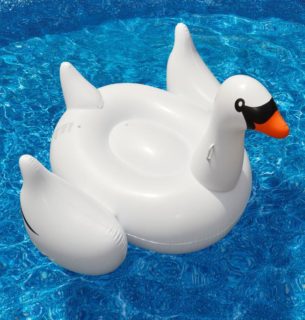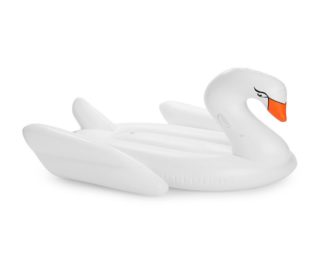Swan-Shaped Pool Toy Claim Won’t Float, According To Second Circuit
Two manufacturers of large inflatable swan-shaped pool floats made a splash in a New York appeals court earlier this month. The Second Circuit rejected a New York company’s attempt to claim exclusive trade dress rights to a swan-shaped pool float, calling the endeavor “impermissibly overbroad.”
In August 2016, Long Island based pool products enterprise, Swimline International Corp., filed a claim for trade dress infringement against Funboy LLC, a California based pool float manufacturer, in the United States District Court, Eastern District of New York. Swimline (formerly known as International Leisure Products, Inc.) alleged that Funboy was selling “knock-offs” of Swimline’s inflatable swan pool float. (Both products are pictured below). While Swimline acknowledged that it holds no registered trademark in its swan design, Swimline alleged its swan float’s trade dress was a protectable composite of various swan-themed elements, including the orange coloration of the swan toy’s beak and the conical shape of the swan toy’s tail. Ultimately, the District Court dismissed Swimline’s claim in November 2017 after concluding that Swimline failed to adequately allege protectable trade dress in its pool toy. On appeal this month, the Second District agreed and affirmed the District Court decision.


Swimline’s Swan Float Funboy’s Swan Float
To successfully state a claim for trade dress infringement, the plaintiff bears the burden of establishing protectable trade dress rights under trademark law. A trademark is a name, mark, figure or symbol that distinguishes the goods and services of one seller from another seller. Trademarks function as source identifiers, which allow consumers to know where a product came from and avoid confusion. Trademarks also function as a way for trademark owners to build a reputation and brand loyalty in the marketplace. Trademarks can exist in things like words, designs, colors, sounds, product shapes (as claimed here), and even scents. What trademark law doesn’t allow, however, is a company to try and monopolize words or symbols or product shapes that competitors might need to conduct their own businesses. This is where Swimline’s claim went belly up.
In the Swimline case, the Second Circuit reasoned that the swan float was not protectable as trade dress for two reasons. First, the swan float is generic – i.e., that it was a swan-shaped pool float shaped like a swan. As the Second Circuit put it, trademark protection is “not intended to protect innovation by giving the innovator a monopoly over a useful product feature.” The purpose of the trademark should be to identify the product’s source, and here, the court said the swan-shaped pool float represents the type of design choice that is “almost invariably” intended “to render the product itself more useful or more appealing” rather than to “identify the [product’s] source.” Second, the court said that Swimline could not identify the elements and features that actually distinguished its trade dress. Swimline “[appeared] to be seeking protection for a trade dress that would encompass any bird-shaped pool float with even a passing resemblance” to Swimline’s float, and trade dress rights should not be extended for the purpose of protecting “an idea, a concept, or a generalized type of appearance.” Swimline’s use of subjective phrases to describe its trade dress like “a pleasing appearance” or “aesthetic proportion” left the Court to guess at what was actually claimed. For those reasons, the court called Swimline’s claimed trade dress “impermissibly broad,” and affirmed dismissal of Swimline’s case.
When used correctly, trade dress can be a powerful tool to enable consumers to build special connections with products. Trade dress is not to be used, however, as a way to monopolize on a product’s shape in an anti-competitive manner. A protectable trade dress needs to be distinctive, non-generic, and definite enough to allow competitors, customers, and the courts to recognize it as a trademark. So, in the end, although Funboy may have ruffled Swimline’s feathers by designing a similar swan float, Swimline did not have protectable trade dress rights to the swan float in the first place.
No aspect of this advertisement has been approved by the highest court in any state.
Results may vary depending on your particular facts and legal circumstances.
As the law continues to evolve on these matters, please note that this article is current as of date and time of publication and may not reflect subsequent developments. The content and interpretation of the issues addressed herein is subject to change. Cole Schotz P.C. disclaims any and all liability with respect to actions taken or not taken based on any or all of the contents of this publication to the fullest extent permitted by law. This is for general informational purposes and does not constitute legal advice or create an attorney-client relationship. Do not act or refrain from acting upon the information contained in this publication without obtaining legal, financial and tax advice. For further information, please do not hesitate to reach out to your firm contact or to any of the attorneys listed in this publication.
Join Our Mailing List
Stay up to date with the latest insights, events, and more






